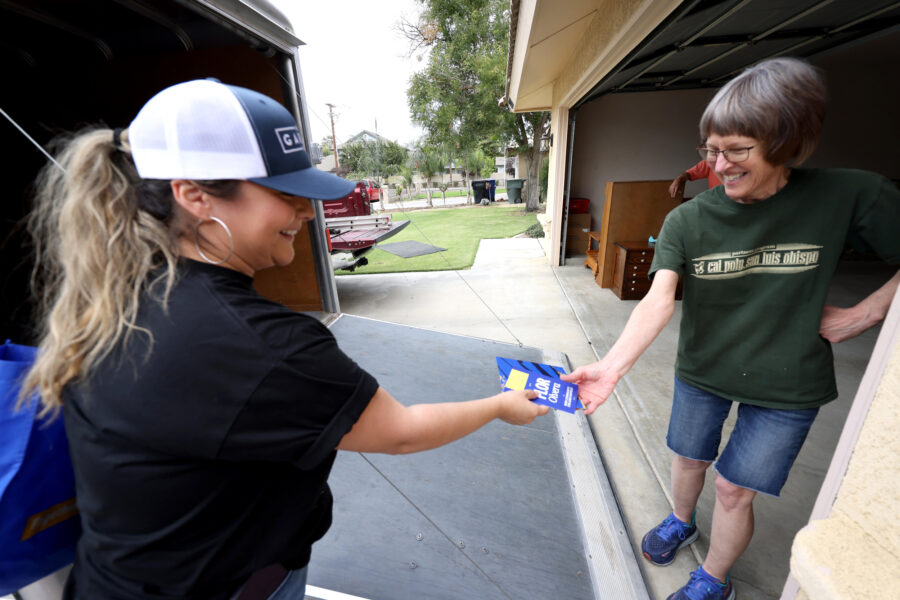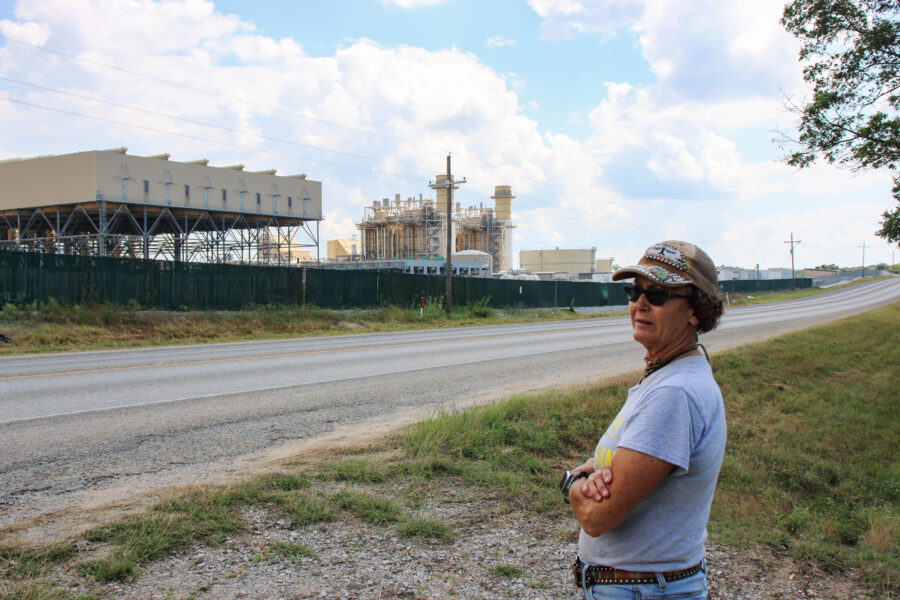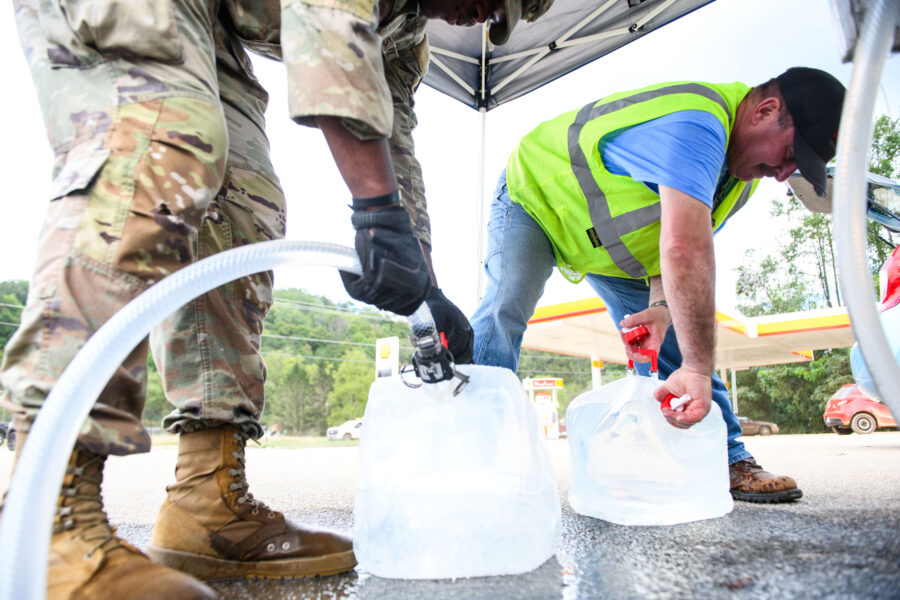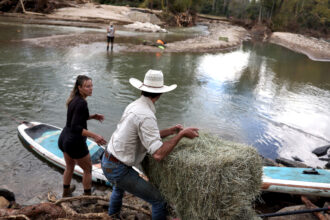N.C. Health Officials Issue Guidelines for Thousands of Potentially Flooded Private Wells
Flooding from Hurricane Helene may have contaminated private wells for thousands of people in western North Carolina, and experts say residents should boil or test their water before drinking it, or even showering in it.
Harmful bacteria, such as E. coli, is the primary concern.
“That’s especially true if it’s an older well and might not have a good sheathing,” said Hope Taylor, executive director of Clean Water for North Carolina, a nonprofit group. “But if the well has been overtopped by flood waters, people should not be drinking the water without boiling it.”
If boiling is not feasible because of a power outage, the Buncombe County Health Department is advising residents to disinfect their water by adding eight drops of bleach for every gallon of water.
Explore the latest news about what’s at stake for the climate during this election season.
The state Division of Public Health has also issued recommendations on how residents should proceed if their wells were flooded:
- Call the county health department for sampling kits and testing. If there is not a health department near you, the county extension agent can help find a lab.
- If you live near potential sources of contamination, the well should be tested for an array of contaminants. These sources include large cattle, hog, or poultry farms; agricultural fields where pesticides are applied; and industrial chemical factories.
- If the well has been flooded, call the local health department or a licensed well driller to chlorinate the well.
- Don’t turn on the electricity to the well pump until flood waters recede.
A third of all North Carolinians—about 3 million people—rely on private wells for their water. Most private well owners live in rural areas.
Private wells are not regulated by the U.S. Environmental Protection Agency. Instead, the state Division of Public Health and local health departments provide testing. However, the well owner is responsible for addressing the contaminants.
Many western North Carolinians still don’t have running water because electricity is required to power the well pump. More than 703,000 North Carolinians lost power during Helene, according to Duke Energy; as of Thursday morning, 170,000 households still did not have electricity.
Rory Mcllmoil lives near Deep Gap, about 10 miles east of Boone, in Watauga County. Nearby Elk Creek rose more than 8 feet and broke its bank, flooding the countryside.
His home was not damaged, but nearly a week after the historic storm, he still did not have electricity or running water.
“Once people’s wells come on, there’s going to be a huge need [for testing],” Mcllmoil said.
His well is 180 feet deep, and flood waters did not overtop it, he said. “But there are a lot of folks whose wells were much closer to the water level than mine.”
Data shows that wells have become contaminated in previous hurricanes. After Hurricane Florence ravaged eastern North Carolina in September 2018, the state Division of Public Health offered free testing to well owners in 23 counties. Of the 1,252 returned for analysis, almost 15 percent tested positive for E. coli or total fecal coliform, which can cause nausea, vomiting and diarrhea.
Some of the detections were attributed to the hundreds of industrialized hog farms in that area of the state, where 33 waste lagoons breached, as well as millions of gallons of sewage overflow from public utilities and private septic systems.
Scientists from the University of North Carolina at Chapel Hill and Virginia Tech also sampled 62 wells in Robeson County, one of the hardest-hit areas. Total coliform was detected in more than a quarter of the wells.
Kelsey Pieper, now an assistant professor of civil and environmental engineering at Northeastern University, was one of the researchers. She said most of the research about flooding and drinking water wells has been conducted near coasts, traditionally the areas most affected by hurricanes.
“We don’t have a lot of knowledge about mountain flooding, from a hydrology standpoint,” Pieper said. “Water velocities tend to be higher in mountain floodings because it’s getting funneled into the valley, where the water is accumulating. In a coastal area, you’re going to see more water spreading out. The flooding mechanisms are different, and we know very little.”
Find your local health department here.
About This Story
Perhaps you noticed: This story, like all the news we publish, is free to read. That’s because Inside Climate News is a 501c3 nonprofit organization. We do not charge a subscription fee, lock our news behind a paywall, or clutter our website with ads. We make our news on climate and the environment freely available to you and anyone who wants it.
That’s not all. We also share our news for free with scores of other media organizations around the country. Many of them can’t afford to do environmental journalism of their own. We’ve built bureaus from coast to coast to report local stories, collaborate with local newsrooms and co-publish articles so that this vital work is shared as widely as possible.
Two of us launched ICN in 2007. Six years later we earned a Pulitzer Prize for National Reporting, and now we run the oldest and largest dedicated climate newsroom in the nation. We tell the story in all its complexity. We hold polluters accountable. We expose environmental injustice. We debunk misinformation. We scrutinize solutions and inspire action.
Donations from readers like you fund every aspect of what we do. If you don’t already, will you support our ongoing work, our reporting on the biggest crisis facing our planet, and help us reach even more readers in more places?
Please take a moment to make a tax-deductible donation. Every one of them makes a difference.
Thank you,
David Sassoon
Founder and Publisher
Vernon Loeb
Executive Editor
Share this article
- Republish
Disclaimer: The copyright of this article belongs to the original author. Reposting this article is solely for the purpose of information dissemination and does not constitute any investment advice. If there is any infringement, please contact us immediately. We will make corrections or deletions as necessary. Thank you.








